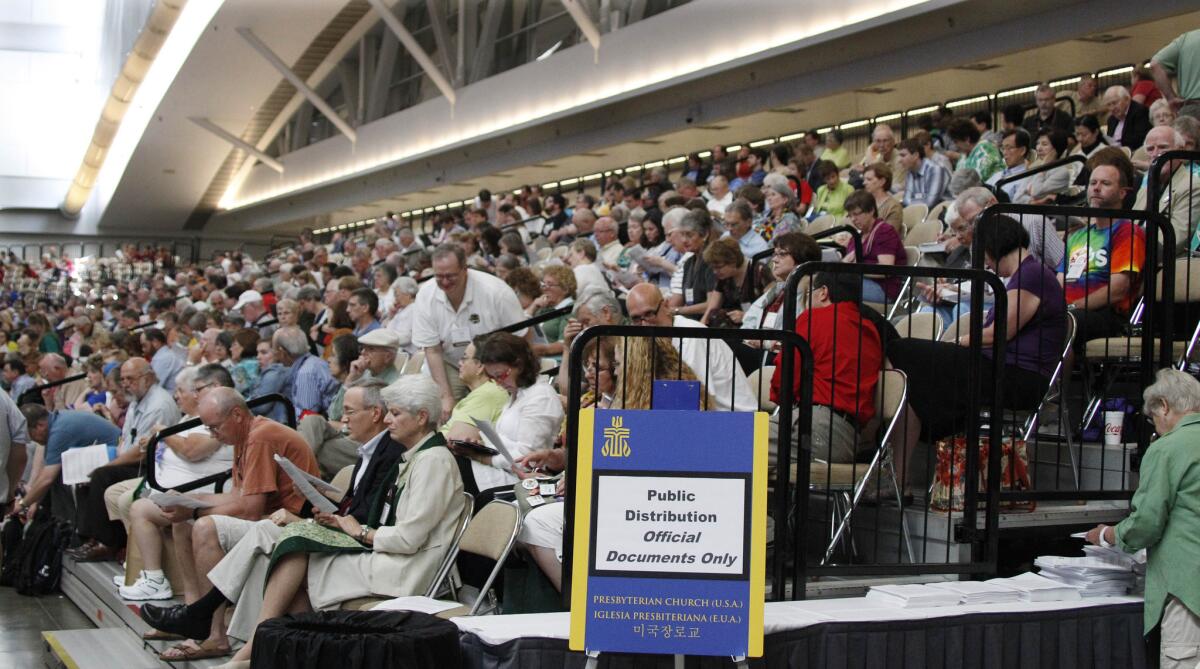Israel criticizes Presbyterian divestment in protest of its policies

The Presbyterian General Assembly’s decision to protest Israeli policies by divesting stock in three major companies has triggered condemnations and congratulations, with the Israeli Embassy calling the resolution “shameful.”
By a seven-vote margin, the Presbyterians became the largest American church to endorse divestment. Friday’s vote at the assembly’s national meeting in Detroit was 310 to 303.
The assembly voted to divest from Caterpillar, Hewlett-Packard and Motorola Solutions. Those companies are said to supply Israel with tools used in building Jewish settlements in the West Bank and East Jerusalem, which Palestinians want as the capital of an independent state. Divestment from the three companies would total about $21 million.
The Presbyterians also voted to reaffirm the church’s stance that Israel has a right to exist. “We recognize the complexity of the issues, the decades-long struggle, the pain suffered and inflicted by policies and practices of both the Israeli government and Palestinian entities,” the church resolution says.
That failed to satisfy critics, including Israel.
The Israeli Embassy in Washington posted its reaction on Facebook: “The resolution of the Presbyterian Church this evening in Detroit is shameful. It removes its ability to be a constructive partner to promote peace in the Middle East.... We would have hoped that [the church] would have joined us in promoting peace and denouncing terrorism.”
Rabbi Noam Marans, director of Interreligious and Intergroup Relations at the American Jewish Committee, called it “a very sad day for Presbyterian-Jewish relations.”
“The [church] leadership is facilitating the delegitimization of Israel in the guise of helping Palestinians,” Marans said in a statement.
But Anna Baltzer, national organizer for the U.S. Campaign to End the Israeli Occupation, called the vote “electric.”
“It indicates a shift in the tide,” Baltzer said. “I think we’re seeing the real mainstreaming of divestment as a nonviolent tool to end Israel’s oppressive policies.”
The Presbyterian resolution notes that the church is not divesting from Israel — only from the companies, and until “the Mission Responsibility Through Investment Committee … is fully satisfied that product sales and services by these companies are no longer in conflict with our church investment policy.” That committee is part of the church’s General Assembly.
Those advocating divestment singled out Caterpillar because its bulldozers have been used to demolish Palestinian homes. Motorola Solutions was selected because the Israeli Defense Force buys the company’s communications technologies. Hewlett-Packard was targeted because the Israeli navy has used its products to coordinate the blockade of the Gaza Strip and because its biometric scanners are used at checkpoints.
Presbyterians opposing divestment argued that the so-called Boycott, Divestment and Sanction movement wouldn’t help peace and that “only a ‘one-state’ of Palestine will satisfy [Palestinians’] long-range goals,” as opposed to the two-state solution that the Presbyterian Church has supported.
In a separate measure, the Presbyterians called for a committee to study the viability of the two-state idea, which it has supported in the past.
In a statement, Motorola Solutions said it had “a comprehensive set of policies and procedures that addresses human rights, which is designed to ensure that our operations worldwide are conducted using the highest standards of integrity and ethical business conduct applied uniformly and consistently.”
Caterpillar said it “has deep respect and compassion for all persons affected by the political strife in the Middle East and supports a peaceful resolution to the Israeli-Palestinian conflict.” In a statement, it continued, “However, we believe it is appropriate for such a resolution to be reached via political and diplomatic channels. Furthermore, Caterpillar does not weaponize machines sold to the U.S. government and transferred to Israel.”
Hewlett-Packard told the Associated Press that its checkpoints for Palestinians were developed to expedite passage “in a secure environment, enabling people to get to their place of work or to carry out their business in a faster and safer way.”
Another critic of the Presbyterian vote said the divestment movement was “largely confined to the far left of the Christian world.” David Brog, executive director of Christians United for Israel, added: “But every victory they win brings the movement further into the mainstream.”
A supporter of divestment, Sydney Levy of the advocacy group Jewish Voice for Peace, said, “It’s important to highlight the impact on interfaith relations. I think through this vote, basically what the church is saying is that they are committed to engaging with us, with their Jewish brothers and sisters and their Muslim brothers and sisters.”
The U.S. Presbyterian Church has 1.8 million members. The Quakers and the Mennonite Central Committee had already voted to divest. And last week, the pension board of the United Methodist Church revealed plans to sell holdings worth about $110,000 in G4S, which provides security equipment and has contracts with Israel’s prison system. The Methodists rejected church-wide divestment, however.
The Bill & Melinda Gates Foundation also has announced that it will divest $167 million from G4S.
Earlier in the week, the Presbyterian assembly voted to recognize same-sex marriage in the church constitution. The amendment, approved 429 to 175, would add that marriage can be the union of “two people,” not just “a man and a woman.” It requires approval from a majority of the 172 regional presbyteries, which will vote over the next year.
The assembly also passed a separate measure that will take effect this weekend, voting 371 to 238 to allow ministers to preside over gay weddings in states where such unions are legal. Nineteen states and the District of Columbia recognize same-sex marriage.
maya.srikrishnan@latimes.com
Follow @msrikris for the latest national news.
Times staff writer Ryan Parker contributed to this report.
More to Read
Sign up for Essential California
The most important California stories and recommendations in your inbox every morning.
You may occasionally receive promotional content from the Los Angeles Times.










